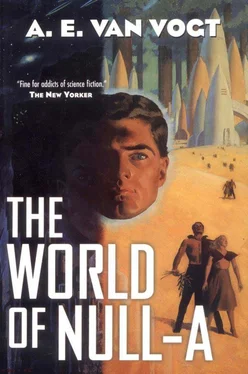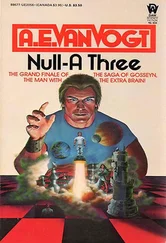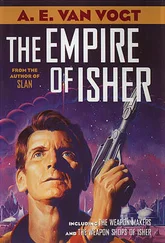He broke off. “We've even examined meteorites as far away as the rings of Saturn in the apparently mistaken belief that some of them might have been hollowed out and fitted up as incubators with Gilbert Gosseyns in various stages of growth. That will show you how seriously we–”
There was an interruption from a man in military uniform.
“Our car is waiting, Mr. Prescott. The ship leaves for Venus on the half hour.”
“Be right with you, General.”
He turned and started to follow the officer. Then he paused and came back. He said, “In a way we're curious to see this Gosseyn III. Since you will already have had cautious thoughts in that connection, I am not giving anything away when I say that we shall kill him, and that then there will be no reason for not killing you. I suggest, furthermore, that there must be an end somewhere to the total number of Gilbert Gosseyns.”
He twisted away and, without looking back, walked to the door. There was a car waiting at the foot of the steps. Gosseyn saw him climb into it. In a few moments, Prescott would be thinking over the meeting. And somewhere along the line he would phone Crang, who would then have to take action.
Gosseyn could hardly stand still in the elevator. His plan to get hold of the Distorter intact was shattered by the accidental meeting, but he wasted no time after Patricia Hardie let him into her apartment. Even as she was murmuring something about how dangerous it was for him to come to the palace, he was tugging a cord out of the bottom of his brief case.
She was amazed when he started to tie her. She had a little automatic up the voluminous sleeve of her dress that she tried to get at. Gosseyn took it and shoved it in his pocket. When he had carried her, bound and gagged, into the bedroom and laid her on the bed, he said, “I'm sorry. But this is for your own good, in case somebody interrupts us.”
He wasn't sorry. He was only in a hurry. He hurried into the living room for his brief case. The tools in it he tumbled onto the bed beside the girl. From the pile he snatched an atomic cutter and ran for the wall he had decided the previous night was the only one the Distorter could possibly be in.
The Distorter must be facing the Games Machine a third of a mile away. And whatever its form, it couldn't be too tiny. At six hundred yards, even a searchlight had to have power and size behind it to shine brightly. Gosseyn adjusted the atomic cutter to penetrate the wire which was underneath the plaster. He sheared an eight-foot square and with a jerk pulled the wall down. Trailing a shower of fine dust, he carried it and set it against the alcove wall. When he came back, there was the Distorter. It was about six feet high by four feet wide by one and a half thick. It was smaller than he had expected and it had no visible wires running from it. Gosseyn caught it between his hands and gave a tentative tug. It came up in his hands lightly. About fifty pounds, he estimated, as he carried it over near the bed and laid it, face upward, on the rug. He stared down at a mass of tiny protruding, glasslike tubes. Obviously an electronic device of some kind, one of the quantity of developments on an intricate variational theme that had begun several hundred years before. He snatched the atomic cutter from the bed and, whirling toward the Distorter, prepared to cut it into bits. As he bent over it, he paused, frowning, and looked at his watch. It was twenty-five minutes to two.
The fever of his urgency abated. Prescott's ship had departed for Venus and nothing had happened. He went over and gazed out of the French windows. The great sweep of lawn that led toward the Machine, spaced here and there with shrubs, was almost deserted. At uneven intervals, gardeners were stooping over flowers, performing the tasks of their profession. Beyond was the Machine, an enormous glittering mass surmounted by its quadrillion-candlepower beacon. It shouldn't take more than a few minutes to get the Distorter over there.
With abrupt decision, Gosseyn picked up Patricia Hardie's bedside phone and, when a girl's voice answered, said, “Give me the chief carpenter, please.”
“I'll connect you with the Palace Works Superintendent,” the operator said.
A moment later, a gruff voice muttered at Gosseyn, who explained what he wanted and hung up. He was quivering with excitement.
“It's got to work,” he thought tautly. “Things like this always work when put through with boldness.”
He hurriedly carried the Distorter into the living room. Then he closed the bedroom door. A short time later there was a pounding at the corridor door. Gosseyn unlocked the door and five men trooped in, three of them carrying lumber. Without pause these three fell to work and crated the Distorter. They had silent cutting machines, automatic screwdriving devices; in seven minutes, by Gosseyn's watch, they were finished. The two truckmen, who had so far done nothing, picked up the crate. One of them said, “We'll have this delivered in five minutes, mister.”
Gosseyn closed and locked the door behind him, and then went into the bedroom. He didn't glance at the girl, but hurried to the French windows. In two minutes a truck with a narrow crate on it wheeled into view on the paved road a quarter of a mile away. It drove straight up to the Machine and disappeared into an overlapping fold of metal. Two minutes later it reappeared, empty.
Without a word, Gosseyn walked over and ungagged and unbound the girl. He was conscious of a vague dissatisfaction, an inexplicable sense of frustration.
Who, then, is sane?
(Quisnam igitur sanus?)
Horace: Satires, II circa 25 B.C.
Patricia Hardie sat on the bed rubbing the circulation back into her arms. She didn't speak, simply sat there massaging, and looking at him, a fault smile curling her lips. The smile puzzled Gosseyn. He glanced at her sharply and saw that the smile was cynical, knowing.
“So you didn't succeed!” she said.
Gosseyn stared at her. She went on, “You were hoping you'd be killed when you came to the palace today, weren't you?”
Gosseyn parted his lips to say, “Don't be silly!” But he didn't say it. He was visualizing his tight-stomached approach to the palace, his successful accomplishment of his purpose, and then his disappointment. Surely, surely men could fool themselves. The girl's voice came again, stinging now. “That's the only reason you came to get the Distorter. You know you've got to die and let Gosseyn III appear. And so you were hoping the attempt would land you in deadly danger.”
He could see it clearly now. No sane man could commit suicide or let others kill him without resisting. And so his subconscious had tried to find a way out. “Do I believe,” he wondered, “in Gosseyn III? I do.” He felt stunned. Because he had told himself again and again that it was impossible. “Can I kill myself? Not yet! But there is a way. There is a way.”
Gosseyn turned from the girl without a word, and started for the door.
“Where are you going?” she called after him.
“Back to my hotel. You can reach me there any time.” He paused at the door. He had nearly forgotten that she had a problem, too.
“Better get some plasterers up here to put that wall back in place. As for what else you should do, I'm assuming you know your position better than I, so I'll leave that up to you. Good-by, and good luck.”
He went out of the door and down onto the boulevard. Downtown, he stopped in a drugstore and asked for a bottle of hypnotic drug.
“Starting to train early for next year's games, eh?” said the druggist.
“Something like that,” Gosseyn replied shortly.
He went next to a voice-recording firm. “I'd like to rent one of your machines for a week for repeat recordings.”
Читать дальше










